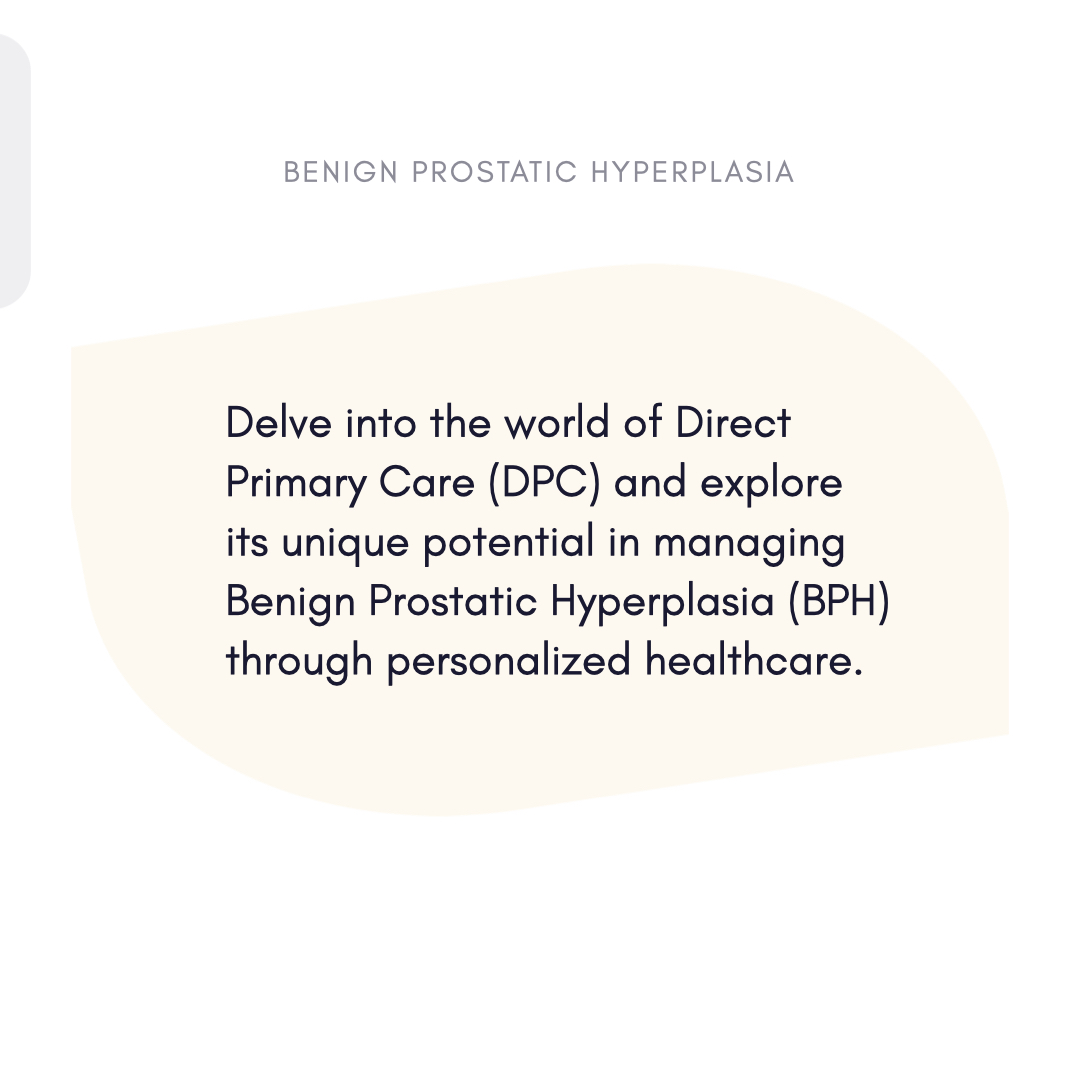Direct Primary Care (DPC) for Benign Prostatic Hyperplasia (BPH): Streamlined, Patient-Centered Urinary Health Care
Affecting millions of men, benign prostatic hyperplasia (BPH) causes urinary symptoms including frequent urination, weak stream, and nighttime awakenings; it is not cancer. Commonly, though, BPH can affect sleep, work, and quality of life. Direct Primary Care (DPC) offers a proactive, tailored approach to appropriately control BPH by combining fast diagnosis, guideline-backed treatments, and lifestyle strategies—all while reducing costs and delays.

Early Detection and Evidence-Based Therapy
- Quick Evaluation:
- Appointments scheduled same-days: See a urologist right away to rule out bladder dysfunction, prostate cancer, or BPH.
- Do digital rectal exams (DRE), urinalysys, and prostate-specific antigen (PSA) tests in-office during visits.
- Therapy and Symptom Monitoring:
- Observations from IPSS: To gauge degree of severity, track development using the International Prostate Symptom Score (in line with AUA recommendations).
- First-Line Medications: Write prescriptions for alpha-blockers—like tamsulosin—or 5-alpha reductase inhibitors—like finasteride—to relax prostate muscles or shrink gland size.
- Modification of Lifestyle, Diet & Fluid Adjustments: Limit evening fluid intake, caffeine, and alcohol to help to reduce evening urgency.
- Exercises for the pelvic floor help to strengthen muscles so improving bladder control and urinary flow.
DPC Customized BPH Administration
- Personalized Methodologies of Treatment:
- Combining therapies: Mix medications with supplements (e.g., saw palmetto) or minimally invasive surgeries (e.g., Rezūm) for synergistic results.
- In surgery, coordination entails See urologists for advanced cases needing TURP or laser treatment to assure ideal follow-up.
- Complete Medical Approach metabolic health: Treat obesity, diabetes, or hypertension— main causes of BPH development—by means of diet and weight control.
- Techniques for Preventive Measures Early on urine retention or kidney disease screening helps to avoid complications.
- Continuous observation:
- Frequent follow-ups let you check the degree of symptoms and adjust drugs for side effects (such sexual dysfunction or dizziness).
- Teach stress-reducing techniques and bladder training techniques (such timed voiding) to increase standard of living.
Why DPC Excels in BPH Treatment?
- Continuity and accessibility:
- Direct Communication: Share with text or phone new symptoms or drug concerns without waiting weeks for visits.
- Work with a doctor aware of your background to maximize therapy adherence and outcomes.
- Visibility of Cost:
- Justified Healthcare: Usually covering discounted specialist referrals, in-office testing, and prostate exams, membership dues also cover
- Give conservative treatments (per AUA guidelines) first priority before more involved surgeries. Cut unnecessary spending.
- Patient Empowerment:
- Offer doable plans for pelvic floor exercises, fluid control, and reduced caffeine in lifestyle coaching.
- Mental Health Support: Address sleep problems or anxiety related to consistent nighttime urination.
DPC Advantage for BPH Patients
- Early Intervention: Quick changes in medicine mean that stop development towards kidney damage or urinary retention.
- AUA Standard Manual Guide: Make sure your symptom monitoring and treatment approach are evidence-based.
- With tailored weight loss and exercise programs, control metabolic issues aggravating BPH.
Final Thoughts
Apart from the bathroom, BPH disturbs daily activities, confidence, and sleep. Fast diagnostics, customized treatment, and lifestyle coaching taken together by DPC helps restore urinary health and quality of life. DPC's perfect urology coordination guarantees advanced treatment free from scattered follow-up for men suffering complex symptoms.






